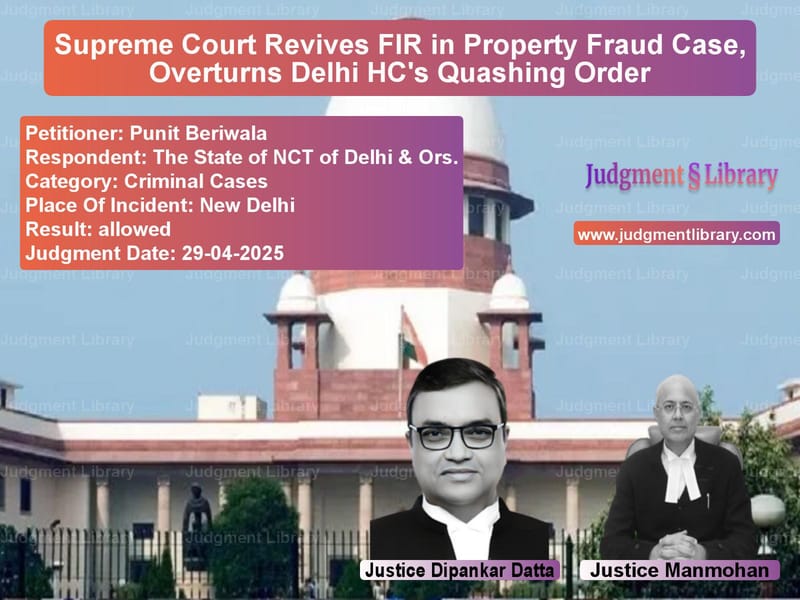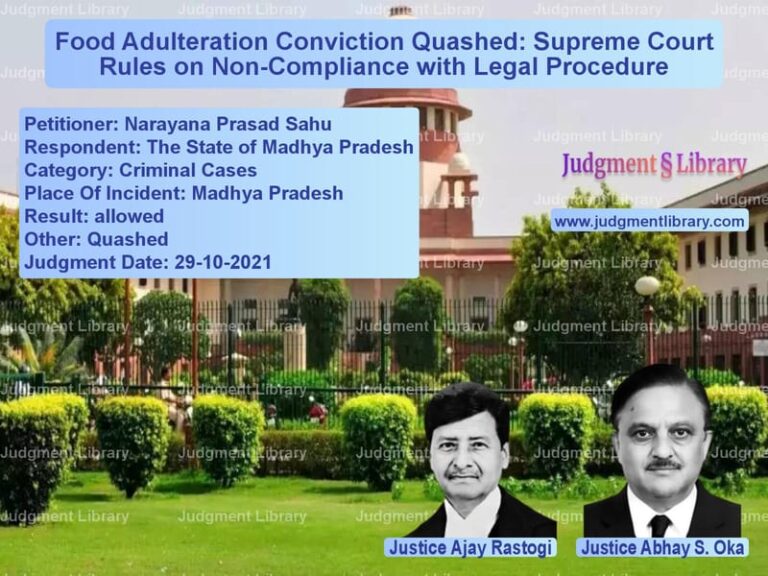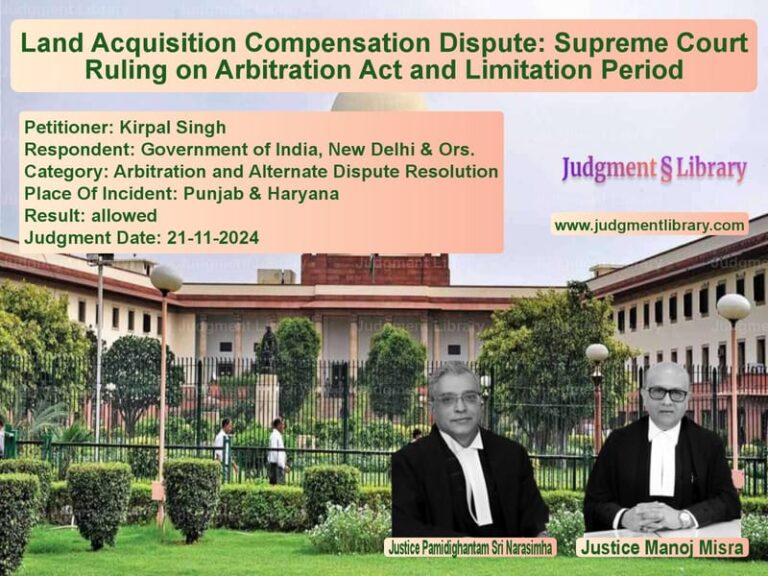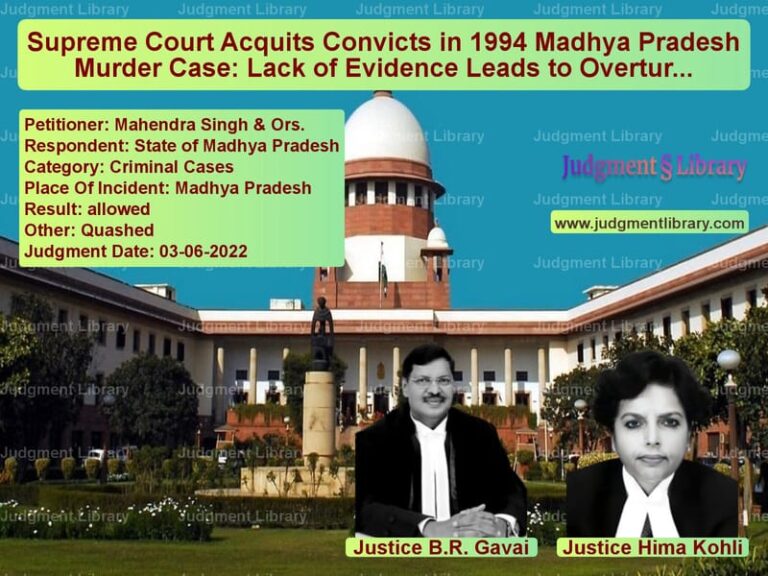Supreme Court Revives FIR in Property Fraud Case, Overturns Delhi HC’s Quashing Order
The Supreme Court of India recently delivered a significant judgment in the case of Punit Beriwala vs The State of NCT of Delhi & Ors., setting aside the Delhi High Court’s order that had quashed an FIR related to alleged property fraud. The judgment, delivered by Justices Dipankar Datta and Manmohan on April 29, 2025, reinstated the criminal proceedings against Vikramjit Singh and Maheep Singh, who were accused of cheating, forgery, and criminal conspiracy in a high-value property transaction dating back to 2004.
The case revolves around a disputed property transaction involving 28-A, Prithvi Raj Road, New Delhi, valued at Rs. 28 crores. The appellant, Punit Beriwala, alleged that he entered into a Receipt-cum-Agreement to Sell in 2004 with Bhai Manjit Singh, who represented himself as the Karta of Bhai Manjit Singh HUF, along with Vikramjit Singh and Maheep Singh (Respondent Nos. 2 and 3) as witnesses. Over time, Beriwala paid Rs. 1.64 crores but discovered in 2021 that the property had been sold to JK Paper Limited, revealing alleged fraudulent activities by the accused parties.
The Supreme Court’s judgment meticulously analyzed several critical aspects of the case. The Court emphasized that “the power of quashing should be exercised sparingly with circumspection, as it has been observed, in the ‘rarest of rare cases'”, quoting from its earlier decision in Neeharika Infrastructure v. State of Maharashtra. This principle formed the bedrock of the Court’s reasoning to revive the FIR.
One of the key arguments addressed was regarding the nature of the agreement. The High Court had treated it as an oral agreement, but the Supreme Court clarified that “Mere heading or title of a document cannot deprive the document of its real nature. Law is well settled in such matters that it is the substance which has to be seen and not the form”, citing the Delhi High Court’s judgment in M/s. Nanak Builders case. This established that the document in question could indeed be treated as a valid agreement to sell.
The Court also dealt with the issue of delay in filing the FIR, which was one of the grounds for quashing by the High Court. The Supreme Court categorically stated that “delay in registration of the FIR for offences punishable with imprisonment of more than three years cannot be the basis of interdicting a criminal investigation”, referencing its decision in Skoda Auto Volkswagen case. The Court noted that the appellant became aware of the alleged fraud only in December 2021 when he obtained the sale deed, and promptly filed the complaint in January 2022.
Regarding the involvement of Respondent Nos. 2 and 3, the Supreme Court found that the High Court had erred in its assessment. The apex court observed that “the gravamen of the allegation was that Vikramjit Singh and Maheep Singh (Respondent Nos. 2 and 3) were equally guilty of misrepresentation as, despite their knowledge to the contrary… they allowed Bhai Manjit Singh who was not competent to execute the Receipt-cum-Agreement to Sell on behalf of Bhai Manjit Singh HUF to represent himself as the Karta”. This finding was crucial in establishing their alleged complicity in the fraud.
The judgment also addressed the issue of cross-FIRs in the case, emphasizing the need for comprehensive investigation. The Court quoted from its earlier decision in Nathi Lal v. State of Uttar Pradesh, stating that in cases involving cross-FIRs, “it would be prudent and fair if the investigation was carried out in a comprehensive manner. After all, the object of the investigation is the discovery of truth”.
In its concluding remarks, the Supreme Court set aside the Delhi High Court’s order and revived FIR No. 94/2022, allowing the investigation to proceed against all accused parties. The Court clarified that its findings were limited to the quashing petition and wouldn’t prejudice the trial court’s proceedings. This judgment reinforces the principle that criminal investigations shouldn’t be scuttled at preliminary stages, especially in complex fraud cases involving multiple parties and transactions spanning years.
Petitioner Name: Punit Beriwala.Respondent Name: The State of NCT of Delhi & Ors..Judgment By: Justice Dipankar Datta, Justice Manmohan.Place Of Incident: New Delhi.Judgment Date: 29-04-2025.Result: allowed.
Don’t miss out on the full details! Download the complete judgment in PDF format below and gain valuable insights instantly!
Download Judgment: punit-beriwala-vs-the-state-of-nct-of-supreme-court-of-india-judgment-dated-29-04-2025.pdf
Directly Download Judgment: Directly download this Judgment
See all petitions in Fraud and Forgery
See all petitions in Property Disputes
See all petitions in Criminal Conspiracy
See all petitions in Judicial Review
See all petitions in Judgment by Dipankar Datta
See all petitions in Judgment by Manmohan
See all petitions in allowed
See all petitions in supreme court of India judgments April 2025
See all petitions in 2025 judgments
See all posts in Criminal Cases Category
See all allowed petitions in Criminal Cases Category
See all Dismissed petitions in Criminal Cases Category
See all partially allowed petitions in Criminal Cases Category







